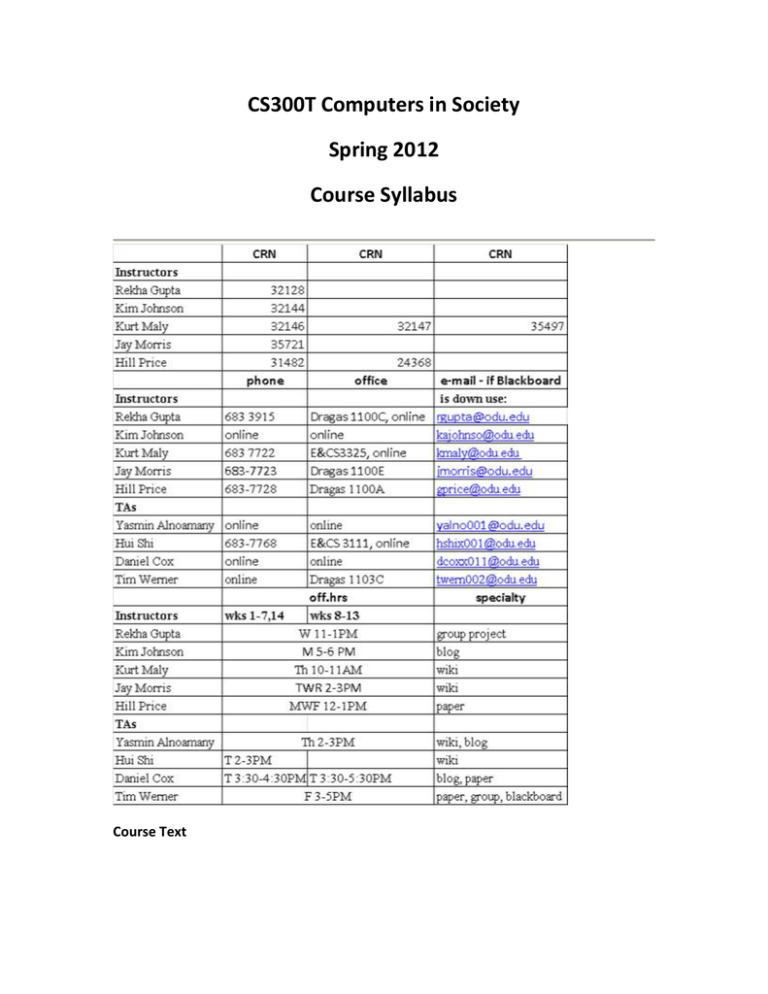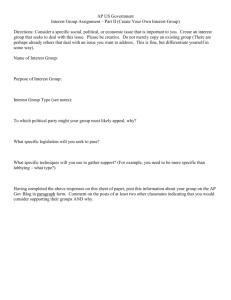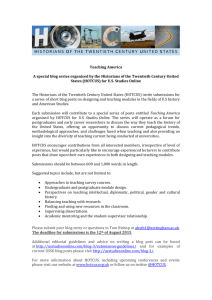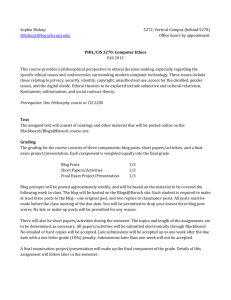CS300U Computers in Society
advertisement

CS300T Computers in Society Spring 2012 Course Syllabus Course Text A Gift of Fire: Social, Legal, and Ethical Issues for Computing and the Internet(3rd Edition); Sara Baase, Prentice Hall, ISBN 978-0136008484 Course Objectives Upon successful completion of this course, the student will have gained an increased awareness of the relative impact that the technological development of the digital computer has had and is expected have on society. The primary focus will be on the problems posed by and benefits offered by computers. Students will research areas of computers in society to include technological hardware advances, as well as software packages. Students will study the history of computers and the Internet and evaluate the impacts of computers on societal issues, communication and social networks, computer crime and fraud, intellectual property rights and constitutional issues, the importance of studying reliability and encryption and ethical behavior. They will create wiki posts and manage and respond to blogs on these topics. Students will explore the applications of computers in education, medicine, transportation, finance and business, entertainment, and marketing and trade. Students will be assigned to teams that will research aspects of these topics and the members of these groups will make presentations on their research either being on the pro- and con-side of a group selected thesis. Finally, students will individually write a research paper on a topic of their choosing relevant to this course. Web course specifics: An email will be sent to all students enrolled in the course a week before the semester begins. The email (both through Leo and Blackboard) will welcome the students to the course, and point them to the syllabus and Blackboard content. Students MUST use odu.edu email addresses throughout the course – use ‘CS300’ as prefix in subject line. All “lectures” are provided to students as content modules in Blackboard and students are responsible to complete all modules according to the schedule/calendar provided. The first two modules will be revealed before class starts; the 3rd is revealed at end of week 2. At beginning of week 3, the modules (8-13) needed for the group project will be revealed and the remaining modules (4-7, 14) will be revealed at end of week 3. The key to success with this web course will be a thorough familiarity with the task list/schedule at the end of this syllabus and the calendar of events provided in Blackboard. It is your responsibility to comply with all the deadlines for submissions of the assignments. Please note that assignments and tasks begin in the first week. Any of the TAs listed at the beginning of the syllabus can be contacted online during their stated office hours. Questions? If you have any technical question such as: “I cannot get my wiki file uploaded, what do I do?” You should first check the available online documentation and tutorials in Blackboard. If you still have problems, contact next a TA who specializes in the area of your problem (see the mapping at the beginning of the syllabus). We have four specialization areas: wiki, blog, written project, group project. Finally contact the faculty member specializing in your problem area (again see beginning of syllabus). If your question concerns anything that will affect your grade directly such as: “I am sick and will not be able to do wiki 3, what do I do?” You should contact the instructor of your section. Course Limitations The subject area of "Computers in Society" is so vast that CS 300T can do nothing more than scratch the surface. We will aim for breadth rather than depth in the “lectures” and for depth rather than breadth in the group projects and written assignments. We will strive to strike a balance between a systematic approach provided through the textbook and a current-event dominated approach that will be used in the research oriented parts of the course. Course References In addition to the required text, students will use the World Wide Web in their research. In Blackboard, we will provide a syllabus, guidelines for the various assignments, a grading scale, a course calendar and the “lecture” materials associated with each of the 14 modules. Course Topics Following the textbook: History of computers and definitions of a society History of the Internet and current uses Societal issues due to computers Communications and social networks Crime and Prevention Intellectual Property/Constitutional Issues Reliability Professional Ethics and Responsibilities Research for group project using the Internet: Education Medicine Transportation Finance and Business Entertainment Marketing and Trade Course Requirements 1. Wiki Posts: Students must perform unbiased Internet research on each of the first 8 topics of the course (see above under ‘textbook’) pertaining to a given societal area. The results of the research must be summarized and documented with appropriate online references. The summaries are to be submitted in the format of a Wiki post in Blackboard. Eight posts will be required of each student. 2. Blog Posts: Students will be asked to contribute to the more biased, or personal opinion/experience, aspects of the course. In the first week, students will start a blog with a description of them and continue with their viewpoints on a self-selected theme from an assigned topic. These documents will be submitted as a personal blog in Blackboard. The students will be required to monitor the responses made to their blog by others in the course. It is expected, as the author of that blog, that reasonable updates are made to the at least one comment. Students are required to read the blog posts made by other students and provide comments to at least one blogger each week. We ensure that the responses are distributed equally to all blogs. Blog writers can earn extra credit by stimulating lively and extensive discussions. 3. Research Paper: Each student will complete a research project that will consist of a final written paper. The project must address issues relevant to the spectrum of course topics. 4. Group Project: Students will be placed into groups of ten or fewer with other class members. The student groups will be required to complete a group project related to the assigned topic area. The project will require research on a current use of computers in one of the following topics: education, medicine, transportation, finance and business, entertainment, or marketing and trade. The group will decide on the thesis to be researched and assign individual members to research specific pro and con aspects. Each student will then individually prepare a presentation (for web courses, students have to augment the PowerPoint presentations with audio (preferred) or with a transcript indexed to the individual slides) the rest of the students will listen to and then critique it. The presentation should be in the range of 5-7 minutes with room for a short questions and answers (1-2 minutes) session. 5. Critiques: Students are required to critique all the student project presentations, incorporating what they have learned from the corresponding module in Blackboard. Students also evaluate the presentations and collaboration effort of the members of their own group. Group memberships At the end of the 1st week, the instructor will post a master list of all Blog and Project groups in the Course Information section; the list will be updated as the groups are finalized by the end of the 2nd week. Course Evaluation Final grades will be based on the following weights: Graded Element Wiki Posts – 8 required of each student Blog - Creation of personal blog and at least one entry - Monitoring of Blog comments with at least one response - Commenting on another blog Group Project - Individual’s group self-critique, collaborative contributions - Individual student presentation Group Project Critiques – of all other 5 groups required Research Paper Total Percentage Points Bonus – Up to 10 additional points may be awarded to those students whose online discussions exceed expectations Points towards Final Grade 20 10 5 5 5 20 10 25 100 10 Course Schedule and Tasks Module Topic Textbook-Based 1 History of Computers 2 History of the Internet 3 4 Societal Issues Communications 5 Privacy, Crime and Prevention 6 Intellectual Property 7 14 Reliability Professional Ethics Group # Research-Based Student Assignments Wiki Post Blog Post Group Project Create and Submit Student Bio Request Group Assignment Module 1 Specialists One Post Assigned Per Week Remaining Teams (Total 8) Specialists Assigned Assigned Research and Submit/monitor/r Collaboratio espond post n based upon Select Topic, Theme Specialist ID Pro/Con Assignment Members Instructor Approval Respond to other Provided blogs Prepare Individual Presentation s Group Research Paper Individual Research on Topic Selection, Thesis, Outline, and References Thesis, Outline and References Due Instructor Approval Research Paper Project 8 9 10 11 12 13 Education Medicine Transportation Finance and Business Entertainment Marketing and Trade Student Requirement Instructor Provided Presentation s and evaluation of own group Critique other presentation s Due for Indicated Group Marketing Entertainment Finance Transportation Medicine Education Student Deadlines (All must be complete by Midnight EST of Date Due) Assignment Deadline Student Bio Friday of Week 1 Wiki Submissions Friday of each Week Blog Specialist Posts Wednesday of Assigned Week Blog Comments to Specialist Posts Friday of each Week Blog Specialists Responses to Comments Sunday of Assigned Week Group Project Thesis and Pro/Con Monday of Week 5 Assignments Group Project Presentations Monday of Assigned Week Group Project Team Member Evaluations Wednesday of Assigned Week Group Project Critiques Friday of Each Week Written Project Thesis, Outline, and Monday of Week 6 Reference List Written Project Friday of the Week Assigned – See above table Instructor Deadlines Assignment Deadline Blog Theme Specialist Assignments – Module Sunday of Week 1 2 Blog Theme Specialist Assignments – Sunday of Week 2 Modules 3-7,14 Group Project Team Assignments Sunday of Week 2 Approval of Group Project Thesis, Pro/Con Wednesday of Week 5 Selections Approval of Written Project Thesis, Outline, Friday of Week 6 and Reference List Course Policies If the files for the written assignments and the presentation are not turned in on or before the designated due dates, a grade of ZERO will be assigned for the missed grading element unless the instructor has given prior permission. Any student who fails to perform in a satisfactory manner on the course project may possibly not pass the course regardless of the student's overall point total. Every communication provided by a student must be professional and respectful. All course related communication has to be done through Blackboard and will be read by the instructor and/or the teaching assistant. Any deemed unacceptable can result in a grade penalty and may be reported as a violation of the Honor Code. Any plagiarism will be dealt with severely with a minimum penalty of a grade of ZERO for the assignment. This is considered a violation of the Honor Code and could result in formal charges. All students are expected to abide by the ODU Honor Code. This means that all exams and assignments are to be the exclusive work of the student. For more details on the ODU honor code, refer to the Honor pledge posted at http://orgs.odu.edu/hc/pages/Honor_Code.shtml.





